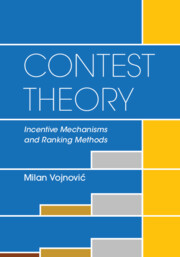Book contents
- Frontmatter
- Contents
- Preface
- 1 Introduction and Preview
- 2 Standard All-Pay Contest
- 3 Rank-Order Allocation of Prizes
- 4 Smooth Allocation of Prizes
- 5 Simultaneous Contests
- 6 Utility Sharing and Welfare
- 7 Sequential Contests
- 8 Tournaments
- 9 Rating Systems
- 10 Ranking Methods
- 11 Appendix
- References
- Index to Notations
- Index
3 - Rank-Order Allocation of Prizes
Published online by Cambridge University Press: 05 January 2016
- Frontmatter
- Contents
- Preface
- 1 Introduction and Preview
- 2 Standard All-Pay Contest
- 3 Rank-Order Allocation of Prizes
- 4 Smooth Allocation of Prizes
- 5 Simultaneous Contests
- 6 Utility Sharing and Welfare
- 7 Sequential Contests
- 8 Tournaments
- 9 Rating Systems
- 10 Ranking Methods
- 11 Appendix
- References
- Index to Notations
- Index
Summary
In this chapter we consider contests that award one or more placement prizes based on the rank of individual performance. Such contests are rather common. The number of placement prizes and how the prize purse is split over a given number of placement prizes vary widely from one contest to another. Perhaps the most common contest design is to award only the first place prize, thus rewarding only the best performing contestant. Another common practice is to award two prizes: the first place prize and the runner-up prize to the best performing and the second best performing contestant, respectively. Also common are designs with three placement prizes: the first place prize to the best performing player, the second place prize to the second best performing player, and the third place prize to the third best performing player. A case that also often arises in practice is a contest that offers one or more prizes of identical values. For example, such prizes can be positions in the next stage of a tournament, admissions to a school program, or research papers accepted for inclusion in a conference program. The rank-based allocation of prizes that is considered in this chapter can be seen as a generalization of that studied in Chapter 2, where the focus was on contests that award only the first place prize. One might expect that devoting some amount of a prize purse to the runner-up and perhaps also to other placement prizes would incentivize lower ability contestants to try harder and as a result yield overall higher performance.
Our goal in this chapter is to characterize strategic behavior in contests that award one or more placement prizes. We shall pay particular attention to identifying conditions under which it is optimal for a contest owner to offer only the first place prize and when it is better to split a prize purse across several placement prizes. There are two important factors here: the informational assumptions about abilities of players and the nature of production costs. We shall see that if players are ex-ante identical with respect to their abilities and the production of each player exhibits a weakly diminishing marginal cost of production, it is optimal for the contest owner to allocate the entire prize purse to the first place prize with respect to both the expected total effort and the expected maximum individual effort in an equilibrium.
- Type
- Chapter
- Information
- Contest TheoryIncentive Mechanisms and Ranking Methods, pp. 95 - 156Publisher: Cambridge University PressPrint publication year: 2016



